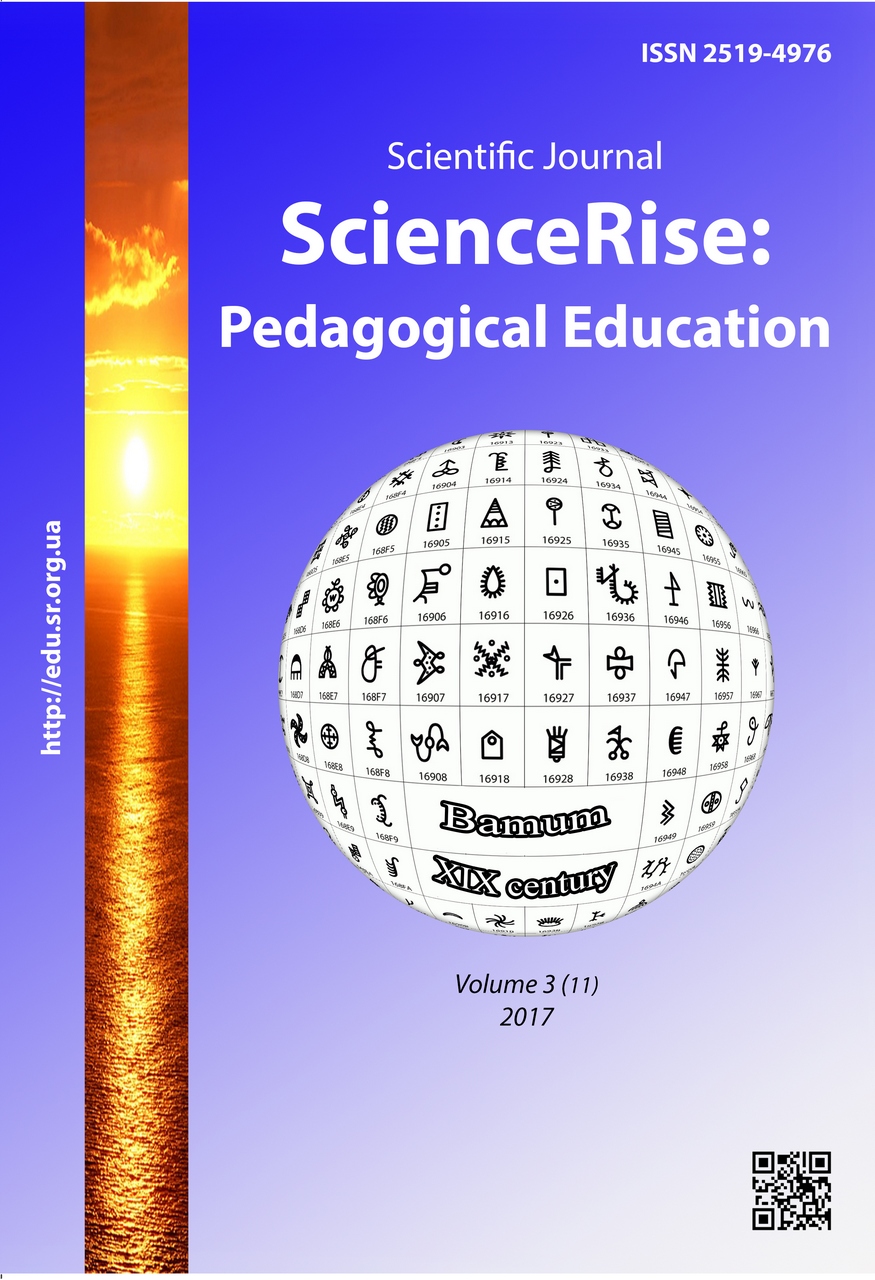Features of using the problem teaching methods in psychological and pedagogical training of future teachers of professional and technical educational institutions
DOI:
https://doi.org/10.15587/2519-4984.2017.97208Keywords:
methods of problem teaching, psychological-pedagogical training, psychological-pedagogical competence, resultsAbstract
The article theoretically grounds the influence of problem teaching methods (problem-informational, partially searching, research ones) on the results of psychological-pedagogical training of future teachers of professional-technical educational institutions within pedagogical process (learning, upbringing, development); within general and professional competences; within psychological-pedagogical competence.
The problem teaching (creation of problem situation due to the skillful use of questions) attracts interest and active reaction of students, involves attention, helps to start teaching conversation and supports the thoughts exchange, reveals true feelings and views, exposes false ideas. This all favors the rational mastering of future professional activity.
The partially searching method (use of pedagogical problems) plays a great role in formation of pedagogical activity experience (projecting, creation and solution of pedagogical situations).
The research method (laboratory works, course projects and out-auditory individual learning-research work within disciplines of psychological-pedagogical training cycle) favors systematization, generalization, fixation and practical application of knowledge of learning courses, improvement of skills of independent learning-cognitive activity, visual reflection of the results of searching work.
It was revealed, that the offered methods of formation of psychological-pedagogical competence in the process of psychological-pedagogical training favor the gradual increase of acquired learning achievements of future teachers of professional-technical educational institutions, provide the transfer of quantitative knowledge accumulation in the new quality – mastering of competences
References
- Pro vyshchu osvitu (2014). Verkhovna Rada Ukrayiny, No. 1556-VII. Available at: http://zakon3.rada.gov.ua/laws/show/1556-18
- Pro Natsionalnu stratehiiu rozvytku osvity v Ukraini na period do 2021 roku (2013). Prezydent Ukrayiny, No. 344. Available at: http://zakon0.rada.gov.ua/laws/show/344/2013
- Zakharchenko, V. M., Luhovyy, V. I., Rashkevych, Yu. M., Talanova, Zh. V.; Kremen, V. H. (Ed.) (2014). Rozroblennia osvitnikh prohram [Develop educational programs]. Kyiv: DP NVTs «Priorytety», 120.
- Podolskyi, A. Y. (2002). Psykholohycheskaia systema P. Ia. Halperyna [Psyholohycheskaya system P. Ia. Halperin]. Voprosy psihologii, 5, 15–28.
- Makhmutov, M. Y. (1972). Teoryia y praktyka problemnoho obuchenyia [Theory and practice of teaching problem]. Kazan: Tatknyhoyzdat, 365.
- Lerner, I. Ya. (1974). Problemnoye obucheniye [Problem learning]. Moscow: Znaniye, 64.
- Menchinskaya, N. A. (Ed.) (1968). Psikhologicheskiye problemy formirovaniya nauchnogo mirovozzreniya shkolnikov [Psychological problems of the formation of the scientific outlook of schoolchildren]. Moscow: Prosveshcheniye, 240.
- Chervinska, L. P. (2016). Zarubizhnyi dosvid vykorystannia pedahohichnykh tekhnolohii na zasadakh studentotsentryzmu. Studentotsentryzm u systemi zabezpechennia yakosti osvity v ekonomichnomu universyteti. Kyiv: KNEU, 289–290.
- Kuzminskyi, A. I. (2005). Pedahohika vyshchoi shkoly [Pedagogy of wishing school]. Kyiv: Znaniye, 486.
- Bezrukova, V. S. (1996). Pedahohyka. Proektyvnaia pedahohyka [Pedagogy. Projective Pedagogy]. Ekaterinburg: Delovaia knyha, 344.
Downloads
Published
How to Cite
Issue
Section
License
Copyright (c) 2017 Olena Kryvylova

This work is licensed under a Creative Commons Attribution 4.0 International License.
Our journal abides by the Creative Commons CC BY copyright rights and permissions for open access journals.
Authors, who are published in this journal, agree to the following conditions:
1. The authors reserve the right to authorship of the work and pass the first publication right of this work to the journal under the terms of a Creative Commons CC BY, which allows others to freely distribute the published research with the obligatory reference to the authors of the original work and the first publication of the work in this journal.
2. The authors have the right to conclude separate supplement agreements that relate to non-exclusive work distribution in the form in which it has been published by the journal (for example, to upload the work to the online storage of the journal or publish it as part of a monograph), provided that the reference to the first publication of the work in this journal is included.







